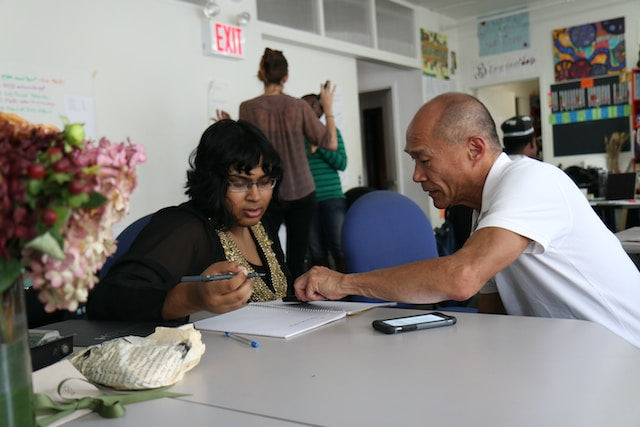Explore our collection of informative and educational blog posts to stay updated on the latest industry trends and expert advice.
Adult Literacy: Better Reading Comprehension, How to Speed-Read, and Some Life-Changing Literature to Improve Your Life

“Every man who knows how to read has it in his power to magnify himself, to multiply the ways in which he exists, to make his life full, significant and interesting.” – Aldous Huxley
According to a survey done by the Jenkins Group, in the USA, 42 percent of college graduates never read another book after college and 33 percent of high school graduates never read another book for the rest of their lives.
This is quite alarming and it’s definitely something that we all should worry about, especially when we’re presented with many other studies that link the high likeability of people ending up in prison if they have literacy problems.
Now, there are many factors that lead to literacy problems in people of all ages, such as the inadequate education system and school infrastructure, living in countries with high poverty and unemployment rates, or growing up in places that have a high crime rate…etc. But, what about the people who are simply not interested, let’s say, in reading books for pleasure?
Society’s views and taste in reading books has changed a lot in the last decade and the technological innovations allow us fast access online to the information we want in just a few clicks. But this kind of behavior has not only damaged the need to read and digest longer pieces for personal advancement or just for the sole fun of reading something, but has also shortened our attention span as well. It’s not uncommon for people to buy books and never finish reading them.
Literacy is not only about reading and writing, but it’s also to help people understand the complexity of the world and life in general. To improve the way you think, communicate and act; to make you a better and smarter human being.
We’ve divided this article into a few sections to help people improve their literacy level and achieve the most of their potential in life:
Reading Comprehension Guide
Improving Your Vocabulary
Building up your vocabulary is one of the key things to further improving your general reading comprehension. The more you read, the better you get at understanding the context in which the words are used.
And to understand the context is far more important to proper comprehension than going through the dictionary and memorizing mechanically all the words that you probably will never use or ever see them written somewhere.
Using big and fancy words wrongly might even destroy your reputation in front of other people and make you appear like a real clown. Leave that to the writers and the people who actually know what they’re talking about.
Language is a tool that was invented to communicate clearly with each other, to share ideas, and to solve problems. There is no point in complicating the way you speak or write, just to appear that you have a rich vocabulary.
Improving your vocabulary takes a lot of time and a lot of reading. While reading, take notes of the new words that appear often and don’t just memorize them; study the context in which they are used deeply. What do they mean? Where and when can we use these new words? Is it necessary to use this new word instead of an easier synonym in order to make a clear point?
Starting from the statistic that we presented in the beginning, a high percentage of adults never read a book after they finish college that way making it harder to learn new words and enrich their vocabulary.
Here are some general tips on improving your vocabulary:
- Read. As much as you can. Instead of watching that soap opera or talent show, grab a good book and sit down for a few hours. Put away all the stuff that distracts you such as your laptop, phone, or the TV. Highlight the words that you don’t understand so that you can come back at them later on.
- Keep notes. Whenever you find interesting words that are used in order to describe something more easily, write them down somewhere (have a notebook just for new words). Writing the words down will help you remember them.
- Write. When you’re put into a position where you have to explain something or communicate ideas, you’re forced to use new words in order to be clear and help other people understand you. Start writing about something that you’re passionate about and use new words that you’ve stumbled upon before.
- Get interested in new things. Many of the new words that you probably don’t know are related to some specific fields or topics so try and explore different areas that you don’t know anything about. You will learn lots of new words and, even better, you’ll gain knowledge on a topic previously unknown to you.
Here are some other great websites that will help you improve your vocabulary:
Vocabulary.com – This website provides an interactive and a very interesting way of learning new words and improving your vocabulary. Its dictionary consists of thousands of questions and sentences to help you learn new words. It also tracks your progress so that you can get better at the topics where you are having difficulties.
Dictionary.com – Online dictionary to help you find out the meaning of the new words that you encounter. The website also has many word games and great articles that will surely improve your vocabulary.
How To Improve Your Vocabulary – About.com – The ESL topic of About.com website has some really good articles about improving your vocabulary. There are a lot of tips and other resources to help you learn new words properly.
Merriam-Webster Online – This website includes a dictionary, thesaurus, word of the day, audio pronunciations, word games and many other resources to assist you while learning new words.
FreeRice.com – Another fun and interactive vocabulary builder. The best part is that for every word that you guess right the website donates 10 grains of rice to help end world hunger.
Visual Dictionary – Also a Merriam-Webster website, this is a dictionary with visual graphics to help you better understand the words that you search for.
Critical Literacy and Enhancing Text Comprehension
Anderson and Irvine in their book called Critical Literacy: Politics, Praxis, and the Postmodern wrote the definition critical literacy perfectly, “Critical Literacy is learning to read and write as part of the process of becoming conscious of one’s experience as historically constructed within specific power relations”.
What we say and do is what really defines us as individuals and what makes us different from each other. Being able to read, analyze, and then criticize what you just read is an intelligent activity and a skill that is worth mastering.
We see all those smart people on television that always impress us with their thoughts and the way they express them in public. Guess what? They weren’t born that way. They became who they are by slowly building their foundation of knowledge and using their own judgment to split what’s right and what’s wrong.
People are biased when they write and not everything that is written is good for you, so without analyzing what you read it’s very easy to be manipulated and get drowned into ideas of all sorts. You should understand that there is always more than one way to read text.
Text comprehension is increased by improving your attention span and by being more focused in your reading activity.
- Find a quiet place where you can read without getting distracted. Your local library is a great option.
- Turn off all the devices that you have with you, such as your phone or mp3 player. They will keep distracting you.
- Text comprehension is enhanced by expanding your vocabulary. (Check the previous section)
- Give your book or paper a quick skim through to understand the topic. Read the table of contents, the introduction, the chapters and other headings.
- Find out what questions is the book going to answer.
- Highlight or write down some of the main concepts as you read along.
- After you finish the book it’s always good to write your thoughts on a piece of paper and put it in between the pages, so that you can recall the information when you come back at it later. Do this, especially, if you read several books on the same topic, so that you can compare the concepts presented and that way improve your critical judgment.
Don’t hesitate to read all sorts of book genres and topics, even those that you previously had no interest in because that’s where you’ll expand your knowledge. It could be a fiction novel that teleports you into a whole different imaginary world or non-fiction that tells the successful story of a Fortune 500 entrepreneur.
Comprehension Strategies and Resources for Educators
SQ3R Textbook Study System – This system was developed by the University of South Carolina in order to help their students read textbooks easily and retain the information that they read. It’s very useful if you’re trying to study some particular topic and don’t have much time.
Strategies for Improving Reading Comprehension Skills – A very good article, written by Patricia Babbitt, with effective comprehension strategies and how to apply these strategies to help us get better at text comprehension.
Using Think-Alouds to Improve Reading Comprehension – Another interesting article by Roger Farr and Jenny Conner on improving reading comprehension by making students think aloud while reading.
Strategies for Teaching Reading Comprehension – written by Ellen K. Cross, this link includes many strategies for teaching reading comprehension to struggling students. It also answers some frequently answered questions about reading comprehension.
Speed Reading Tips and Methods
Is It Really Possible?
You probably have heard about people who read lots of books in a very short time, and you might have wondered how it is even possible to read books that fast. Theodore Roosevelt was a real passionate reader. He could read a book or two in a day. John F. Kennedy was known for his reading speed as well and encouraged all of his cabinet to take speed reading classes.
Average readers have a speed of around 200 words per minute. Good readers can read at about 400-500 words per minute while having good comprehension of the material. There are people who claim to read at 800-1000 wpm but the comprehension percentage drops and there is no point in speed reading if you don’t know what you just read.
If, the last time that you grabbed a book to read, it took you a full month to finish it, then you’re probably a not so good reader. Practice makes perfect, true, but you’ll never improve your reading speed if you don’t fix some of the usual reading problems that a lot of people have because of the way we learned to read at school.
So yes, speed reading is a skill that you can master with time and you’ll be able to enjoy reading all those wonderful books that you never had the time to read before. There are many methods that speed-readers use, so it’s all up to you to choose the one that works best for you.
Speed Reading Methods That Work
Stop Subvocalizing
At school, we were taught to read each word one by one aloud, and now even if we don’t read aloud there is still a voice inside us that sub-vocalizes each word while reading. This is one of the key problems that make us read not as fast as we want to.
Identify that internal voice and instead of sub-vocalizing, try counting 1, 2, 3…etc. or humming while reading. Just glide through the words with your eyes. The important thing here is to keep practicing this as much as you can and whenever you find yourself subvocalizing just replace it with counting or humming.
It takes time to do this perfectly because you’ll always go back to the old habit, but keep practicing and you’ll get used to it.
Read Clusters of Words
After you overcome the problem of sub-vocalizing words while you’re reading, you need to learn how to read clusters of words. Our eyes can focus on 3-4 words at a time, so try grouping words and focus your eyes on those groups instead of single words.
Avoid focusing on words that don’t give any specific information, such as: and, a, an, the…etc. Your brain will automatically pick these up and connect everything.
Stop Backtracking
One of the biggest problems that average readers face is going back and re-reading previous lines. Backtracking will slow your down a lot, so try using your finger to avoid going back and reading the same words.
They important thing here is to stay focused on what you’re reading, so that you don’t have to go back and read the same lines again. With time you’ll train your eyes to stop backtracking without having a need to use the finger all the time.
Skim Through
We pretty much all learned how to skim in the age of internet and online newspapers, so skimming is not something that is unknown to us, but many speed readers like to skim through text.
When you grab a book to read, it’s good to do a little bit of pre-reading in order to understand what each chapter is about so that you can move quickly through the ones that you’re not interested in and focus on the ones that you are.
When you skim through text your eyes will only pick the most important words in a line and then your brain does the rest. There is no point in wasting your time reading material that you won’t get real benefit from. So, avoid the filler text and try to find the main chapters where the most valuable information is presented.
Read a Lot
Improving your reading speed takes time and a lot of practice, so grab a few books and just start reading as much as you can. Keep a list of the books that you want to read and don’t start reading a new book before finishing the last one.
Remember that reading should be an activity that is fun and that you do it for pleasure. There is no point in speed-reading a good novel that is meant to be enjoyed in every detail. Also, good comprehension should be your main goal when reading, so keep that in mind.
Software to Help You Speed Read
Spreeder – This a free online software that helps you improve your reading speed. You can add your own text and choose how many words per minute you want to see.
Eyercize – Another free speed reading tool that works great. It has many options that you can customize. There’s also a bookmarklet for your browser so that you can speed-read through any material that you stumble upon online.
Pocket – Pocket allows you to convert any website’s content into a minimalist version with only the main content for you. It removes all the ads, comments, and other parts that clutter the website, so that you can have a better reading experience without getting distracted by other stuff on the website.
Acceleread Speed Reading Trainer – This is a great application for iOS devices. It works on both the iPhone and the iPad. It’s a great app if you want to track your progress and you’re your favorite books on mobile.
Reading Trainer – This is another speed reading app, but for those devices that run Android OS. It includes 12 exercises to help you improve your reading speed and retention as well.
ReadSpeeder – This is a free speed reading course that will help you read faster and enhance your reading comprehension. Many people claim to have increased their reading speed by taking this course.
Literacy Web Resources for Kids
PBS Kids Reading Games – This is a great collection of word games created by PBS Kids to help children improve their literacy in an interactive and fun way.
Reading, Literacy and Your Child – Article with some of the most frequently asked questions about children literacy questions and answers, by the University of Michigan.
Project Gutenberg – Project Gutenberg offers over 42,000 e-books in epub, mobi. Kindle formats, free of charge. Old classics have their copyright expired so this project helps digitizing great books so that anyone can read them.
International Children’s Digital Library – The mission of this organization is to support children in becoming members of the global community by helping them with free literature and interactive resources to learn about every culture and language in the world.
BBC Schools Website – Created by the BBC Schools website, this kids literacy section is really great with plenty of interactive resources and games to help children improve their reading.
FunEnglishGames.com – Great website with games and worksheets to help kids improve their reading comprehension.
Abcya.com – This website offers free educational computer games and other activities for kids, created and approved by certified school teachers, to help them use the computer for educational purposes.
Literacy Planet – With over 10,000 interactive English literacy activities for children, Literacy Planet is one of the most helpful resources when it comes to developing good literacy skills.








